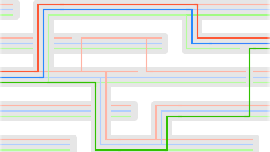
Consider the Markov process taking values in the partitions of \$$\mathbb{N}\$$ such that each pair of blocks merges at rate one, and each integer is eroded, i.e., becomes a singleton block, at rate \$$d\$$. This is a special case of exchangeable fragmentation-coalescence process, called Kingman's coalescent with erosion. We provide a new construction of the stationary distribution of this process as a sample from a standard flow of bridges. This allows us to give a representation of the asymptotic frequencies of this stationary distribution in terms of a sequence of hierarchically independent diffusions. Moreover, we introduce a new process called Kingman's coalescent with immigration, where pairs of blocks coalesce at rate one, and new blocks of size one immigrate at rate \$$d\$$. By coupling Kingman's coalescents with erosion and with immigration, we are able to show that the size of a block chosen uniformly at random from the stationary distribution of the restriction of Kingman's coalescent with erosion to \$$\{1, \dots, n\}\$$ converges to the total progeny of a critical binary branching process.



